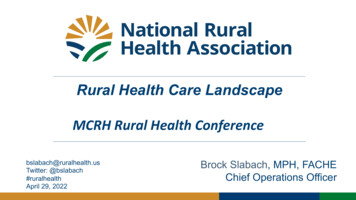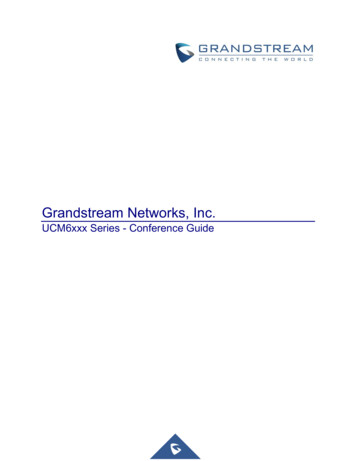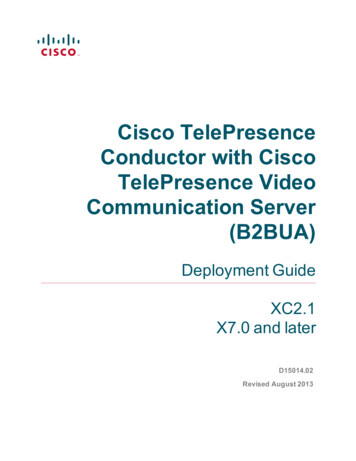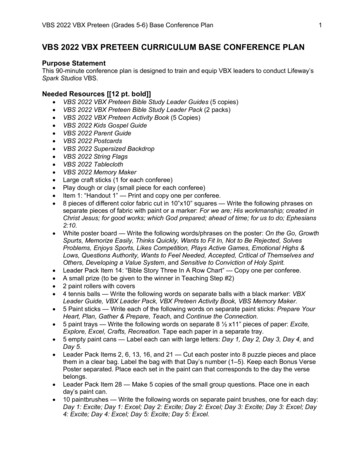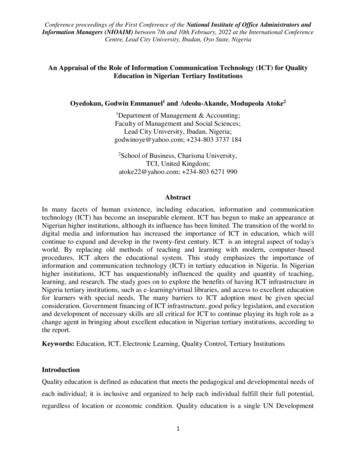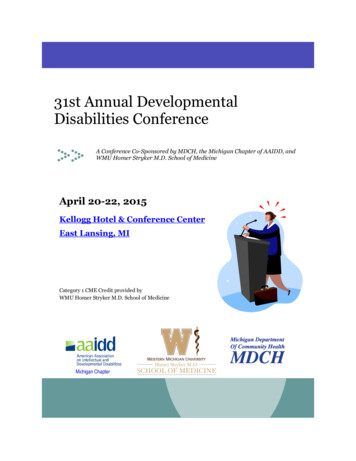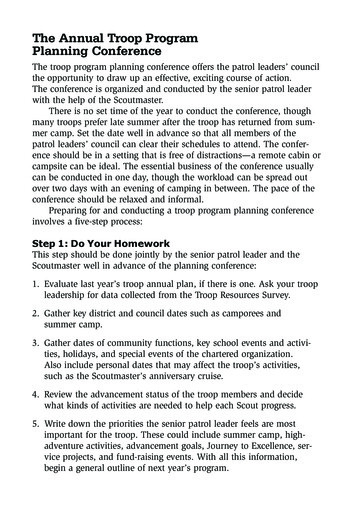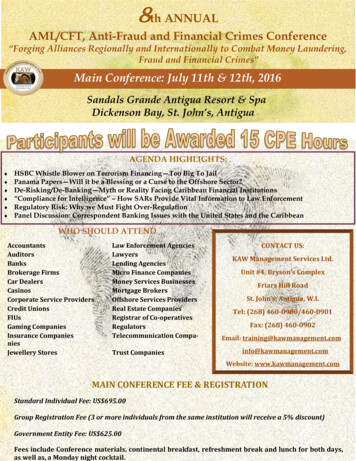
Transcription
2022 Annual ConferenceAustin, TX Hilton Austin May 11-14, 2022WEDNESDAY, MAY 1110:00am - 5:00pm Conference Registration1:00pm - 5:00pm Exhibit Hall Open12:00pm - 12:30pm First Timers’ SessionIf this is your first NOSSCR conference or if you are a new member, you arecordially invited to learn about NOSSCR and how to make the most of yourconference experience. Meet your Board representative, NOSSCR’s President,and Executive Director.12:45pm - 1:45pm Welcoming RemarksBarbara Silverstone, Executive DirectorDavid Camp, PresidentPAC Circuit Challenge winners announcedSSA initiative updates by Acting Commissioner of the SocialSecurity Administration Dr. Kilolo Kijakazi1:45pm - 2:15pm Coffee with Exhibitors2:15pm – 3:45pm Choose from one of the following sessions:A. Social Security Disability, The Journey BeginsBruce Billman, Esq.Alan Polonsky, Esq.Two very experienced practitioners will be taking you through a tour of thebasic concepts of what it means to be considered disabled under the SocialSecurity Act and the process that the Social Security Administration uses tomake that determination. We will explore the different types of benefitsunder Title II and Title XVI of the Act. We will go through each of the steps ofthe sequential evaluation process. We will discuss the application processand the appeals process and provide basic guidance on case presentation.B. Demise of the Treating Physician RuleJacques Farhi, Esq.1 Page
Craig Jarvis, Esq.Michael Stretton, III, E.D.P.N.A.A discussion of the origin and importance of the Treating Physician Rule witha careful look at how it came to an end for applications filed after March 27,2017. For more than 20 years this rule was the most frequent reason forremands from the Federal Courts and the best shield against abusive andcapricious decisions, we will discuss what can be done to bring it back. Thissession will also cover recent challenges in federal courts to theCommissioner's regulations that abrogates the treating physician rule.C. Developments in Case Law. 2021-2022 – EthicsProf. Jon Dubin, Esq.Carolyn Kubitschek, Esq.The workshop will look at recent developments in the case law during thelast 12 months, focusing primarily on decisions of the Supreme Court andon the leading decisions from the courts of appeals. The session will providea thorough analysis of the most important decisions. The workshop willidentify trends in the case law, issues that have surfaced repeatedly indifferent circuits, arguments that the government appears to be raisingsystematically throughout the country, and the latest developments in EAJA.There will also be a discussion of ethics, as related to appeals. Because manyof these decisions guide the way we practice at all levels of appeal,representatives have an ethical obligation to ensure they know andunderstand the holdings.3:45pm - 4:00pm Coffee Break4:00pm - 5:00pm Choose from one of the following sessions:A. Returning to Work Before an Award of Benefits: Don’t GiveUp!Thomas Krause, Esq.It can be years from the time your client applies for disability benefits, untilthe time benefits are awarded, especially in cases remanded for asupplemental hearing. Sometimes, the client will return to work. What doyou do then? This presentation will look at several alternatives, includinghow to determine if the work is substantial gainful activity, whether it is anunsuccessful work attempt, and whether a trial work period is available.B. What’s Good for the Goose Luis Gracia, Esq.This workshop will discuss arguments and tactics to effectively use C.F.R.404.1520c and 416.920c “How we consider and articulate medical opinions2 Page
and prior administrative medical findings for claims filed on or after March27, 2017” to neutralize unfavorable medical opinions by Social Securitydoctors.C. Taking the Long View: Preparing Your Case for a DifficultHearing and BeyondSarah Frederick, Esq.Christopher Grover, Esq.The speakers will present an overview of preparing a case for anAdministrative Law Judge hearing, addressing topics including: Hearing evidence and construction Handling VE testimony considering a possible appeal The importance of submitting additional evidence at the Appeals Council How to submit additional evidence in USDC cases Do you even want to appeal? Practical considerations to getting yourclient’s case approved as quickly as possible5:15pm - 6:15pm Choose from one of the following sessions:A. Build a Stronger Argument for Clients with Mental DiagnosesAnn Biddle, Esq.Emilia Sicilia, Esq.Learn how to pull relevant signs, symptoms, and findings from medical andother records and how to use it in the sequential evaluation. We will focuson how to create a solid and detailed residual functional capacity (RFC) formand then how to use it at the hearing.B. File Mining: Digging for Hidden Gems to Win the CaseJ. Blair Biser, Esq.A claimant’s electronic file can be a treasure trove of information to helpevaluate our client’s disability claim. This session will provide tips inidentifying interpreting and leveraging documents in the file to evaluate,support, and win the case.C. Transition Planning, Law Firm Succession and ExitOpportunities for the Social Security Disability PractitionerMoe Greenberg, Esq.Tom Lenfestey, Esq.Most successful Social Security disability law firms have members who havespent their working years representing thousands of clients. In so doing, theyhave created firms which are valuable assets that can continue to attractclients even after departure of the principals. Few of these practitioners,however, have given enough thought to the complicated transition issues3 Page
that they will face in deciding their exit strategy. The choice of whether andhow to “take down the shingle” is fraught with complexities no matterwhether a practitioner decides to “simply” close the practice, wind thepractice down, transfer the firm or employ some other hybrid solution. Inthis session you will learn to make difficult personal assessments regardingyour mental and physical health, stress tolerance, financial needs, anddesired risk exposure.7:00pm Dine-AroundsNo need to eat alone! Join other attendees for a night of casualdining and fun with some new and some familiar faces. NOSSCRwill make reservations at a few local restaurants for eveningdinner. Sign-up sheets will be posted on NOSSCR’s message board inthe registration area during check in on Wednesday afternoon. Meetnew people, try a new cuisine, and explore Austin! Each attendeewill be responsible for paying for his or her meal costs.Thursday, May 127:00 am-5:00 pm Conference Registration7:00am - 5:00pm Exhibit Hall Open7:30am – 8:30am Networking BreakfastEnjoy your continental breakfast while networking with your colleagues.8:45am – 10:15am Choose from one of the following sessions:A. Looking for Evidence in All the Right PlacesKevin Liebkemann, Esq.Richard Weishaupt, Esq.We all know to request our client’s medical records and to get opinionreports from treating sources in disability claims. However, sometimes thatconvincing piece of evidence that sways the adjudicator in your client’s favorcomes from less obvious sources. Join Kevin Liebkemann and RichardWeishaupt, who combine for over 60 years of experience in Social SecurityDisability practice, for their advice on where you can look for and find suchevidence in all the right places.B. Connecting the Dots: How to get from diagnosis to SSA AdultListings to Supporting Evidence4 Page
Barbara BushNatalie Montfort, Ph.D.In this session, we will use case examples to cover several DSM-5/ICD-10diagnoses and discuss how their symptoms correlate to the SSA AdultListings. Examples for effectively gathering evidence to document theindividual’s disability will also be reviewed.C. Cross-Examination ClinicJames Auffant, Esq.Sarah Jacobs, Esq.Ted Norwood, Esq.Cross the VE and the ME! We hear it constantly and it is good advice. If youaren’t used to performing a tradition cross examination, we’d like to helpyou get comfortable with it. It is hard to take time during your practice topractice this skill, and trust me, cross examination is a skill. This is a safeplace to learn an important practice tip.10:15am – 10:45am Coffee with Exhibitors10:45am – 11:45am Choose from one of the following sessions:A. Do The App!: Grow Your Practice and Increase Your Chancesfor SuccessVicki Dempsey, Esq.Terrell Dempsey, Esq.Many Social Security attorneys advise potential clients to do applications ontheir own and return to the attorney if they are denied. This can be a hugemistake. In our presentation, we will detail all the legal and business benefitsthat have accrued to us by doing applications.B. Overpayments, Avoiding Them and Best Kept SecretsEdwin Lopez-Soto, Esq.Debora Wagner, Esq.The most common reason for an overpayment of disability benefits is workactivity on the part of the disability beneficiary. Many disability beneficiariesfind that living on the disability benefits are difficult, so they find a job tosupplement their income. The problems begin there. Learn how to avoidthem the difficulties between reconsideration and waiver of theoverpayment and about the best kept administrative waiver secrets.C. SSDI/SSI: Beyond the BasicsJoanna Suyes, Esq.5 Page
You understand the basic similarities and differences between SDDI and SSI,now learn some common problems that arise and how to handle them. Wewill discuss early retirement, Workers’ Compensation offsets, unemploymentbenefits, short- and long-term disability and what to do when your client’searnings after onset are higher than Substantial Gainful Activity.12:15pm – 1:30pm President’s LuncheonJoin your colleagues for a festive luncheon celebrating our return to an inperson conference! The Eileen P. Sweeney Distinguished Service Awards willbe presented. Please note, only registered attendees may attend thisluncheon.1:30pm – 2:30pm Choose from one of the following sessions:A. Pre and Post Hearing Briefs– ProfessionalismScott Smith, Esq.A pre and post hearing brief is essential for any proper case presentation.Preparing these briefs are professionally important and those who so doshow a higher degree of care for the client, which judges will recognize. Herewe will discuss how a prehearing brief should be organized, the content,length, and how to deal with bad evidence. We will discuss post hearingbriefs when they are needed and what to include. Get ready for hearings!B. The Ethics of a High Case Load Practice: Preserve YourHappiness, Stay Organized, and Help More People– EthicsRandi Johnson, Esq.This presentation will validate the overwhelm nearly every Social SecurityDisability practitioner faces when thinking about a growing case load – wewant to help more people, but we can’t fathom working more hours or takingon so many of the administrative headaches. Will we drop the ball and missa deadline? What if I hire the “wrong employee” and they mess up big time?We will explore the low-tech and low-cost methods to build smarter, notharder!C. Spotting Winning Cases: Tips for Interviewing Clients,Training Staff, and Referral SourcesPaul McGrath, Esq.Asha Sharma, Esq.While there is no sure-fire way to screen out unwinnable cases, it is possibleto minimize the unwinnable cases from those that have a fair chance ofsuccess. Presenters will discuss their criteria for spotting winnable cases –and how to train staff to spot winnable cases. Presenters will also discusshow to train referral sources to send better, winnable referrals.6 Page
2:45pm – 3:45pm Choose from one of the following sessions:A. Common Pitfalls in the Transferability of Skills Assessment(TSA)Nathan Craig, Esq.Jaime Nobis, Esq.The Transferability of Skills Assessment (TSA) is a common issue withclaimants who have skilled past relevant work. TSA, as found in the ProgramOperations Manual System (POMS), is misunderstood by manyrepresentatives, and misapplied by most vocational experts and lower-leveldecision makers. Understanding what is a "skill" and how it "transfers" alongwith using TSA to your advantage can make the difference in a favorabledecision.B. Discussing the Steigerwald Class ActionIra Kasdan, Esq.Jon Ressler, Esq.The Steigerwald Class Action caused SSA to recalculate back benefitpayments to over 130K disabled beneficiaries and uncovered that SSA owed70K of them over 100 million in back payments. This session will discussthe problem that the case corrected and how representatives can know theirclients are being paid correctly), how the case came into being, and thehighlights of the litigation on the merits and as to the applicability of 406bfees.C. Fee Petitions for Administrative Work– EthicsMary Kay Fowler, Esq.Overview of fees and fee petitions for administrative services performed. Thissession will include information on when and how to file a fee petition,appropriate follow up with Social Security Administration to get paid orapproval to get paid, and the ethical management of fee requests andcollection. This session will also cover the ethical requirements of the rulesof conduct representatives must follow when seeking to be paid on SocialSecurity cases.4:00pm – 5:00pm Choose from one of the following sessions:A. Hearing Brain vs. Federal Court Brain: Practical Strategies toTackle Common Case IssuesElizabeth Haungs, Esq.Zachary Zabawa, Esq.7 Page
As we face rule changes, harder ALJs, and lower approval ratings nationwide,it is more important than ever to look at every case for how to win at thehearing level—and how to win at a federal appeal later if you exhaust theadministrative remedies and things don’t go your client’s way. This sessionwill look at the top, common issues that come up at both appeal levels, andhow to handle them at the hearing and in your federal court briefs.Integrating your Hearing Brain and your Federal Court Brain to look at issuesfrom both sides will help your clients win the benefits they deserve—andmake you an even better representative in the process!B. Is Success at the Appeals Council Possible?Sarah Bohr, Esq.Linda Cosme, Esq.The answer is.YES! As you will hear from an advocate and former AppealsCouncil officer, winning is indeed possible. This session will review SSA’s owndata regarding the most successful issues to raise and the criteria theAppeals Council follows for selection cases to review; how to get the AppealsCouncil’s attention, and a list of top ten winning arguments. The material willalso include samples of winning letter briefs.C. Prepping the Client from Intake Through HearingMichael DeYoung, Esq.Joshua Matejczyk, Esq.Thomas Scully, Esq.In this session, the speakers will walk you through everything you need to doto prepare your client for their hearing, from initial consultation throughfinal hearing prep. They will discuss when and how to address gaps intreatment, changing doctors, and obtaining medical source statements.They will also review how to advise your client on what to expect at thehearing and how to tailor their testimony to ensure success.5:15pm – 6:15pm Circuit RoundtablesFirst CircuitThird CircuitFifth CircuitSeventh CircuitTenth Circuit6:45pm – 8:45pm NextGen Nightcap: Join Us at Cidercade!Join your NextGen colleagues for a private party on the lakesidepatio of Cidercade Austin! Your first drink and entrée are on us.Get to know people who understand your work from around thecountry over pizza and wings and throughout the arcade.8 Page
This event is brought to you by the generous sponsorship of TheDisability Mastermind.Additional food and drink are available for purchase. NOSSCRNextGen events are for representatives who are age 40 or younger orwho have 10 years or less experience in representing Social SecurityDisability claimants.Friday, May 137:00am - 5:00pm Exhibit Hall Open7:30am – 8:30am Networking BreakfastEnjoy your continental breakfast while networking with your colleagues.8:30am – 9:30am Circuit RoundtablesSecond CircuitFourth & DC CircuitsSixth CircuitEight CircuitNinth CircuitEleventh Circuit9:45am – 10:45am Choose from one of the following sessions:A. The A,B,D, and E of Winning: How to Win Your Case BeforeGetting to the Medical RecordsDavid Gerson, Esq.Hector Ramirez-Rivera, Esq.As disability advocates, we focus virtually all of our attention on exhibits inthe “F” section to win our cases. But what about the rest of the file? There arehidden gems and potential landmines in the other sections that are oftenoverlooked. The purpose of this session is to identify those parts of the file,aside from the medical records, that can both harm and help our clients andaddress how to deal with them in pre-hearing prep and at the hearing itself.These areas include work history reports, earnings records, DDS assessmentsand function reports, among others.B. Administrative Law Judge Bias—How Do I Address It? –ProfessionalismBenjamin Feld, Esq.9 Page
While most ALJs are neutral and objective arbiters of fact, sometimesobjectivity goes out the window. At this stage, your role as representativegoes beyond presenting a case, but morphs into defending our client andyourself. In this session you will learn how to address concerns that your ALJis biased and the professional way to handle it for you and your client.C. A Guide to Making Migraine Cases Less of a HeadacheStephen Sloan, Esq.The World Health Organization recognized that migraines on their own werethe sixth highest case of years lost due to disability. Headaches disorderscollectively were the third highest. Yet very few disability allowances aremade based upon headache disorders. This session will give you acomprehensive guide to SSR 19-4p, teaching how to identify migraine cases,and develop evidence that will help you win these cases.11:00am – 12:00pm Choose from one of the following sessions:A. Common Fact Patterns Involving the SSI Resources Rules andStrategies for Dealing with ThemMark Bronstein, Esq.Linda Landry, Esq.Unchanged since 1989, the SSI resource limits ( 2,000 for individuals, 3,000for couples), vague and confusing POMS provisions on what resources arecountable and when, and claimant lack of information and understandingof the rules all too often result in SSI benefit denials, terminations, andoverpayments. In this session we will review the regulations and especiallythe POMS, which act as a framework for determinations in this area, anddiscuss proven strategies which may be helpful in dealing with these factpatters and others.B. Often Overlooked Appealable IssuesGeorge Piemonte, Esq.Laura Beth Waller, Esq.At first glance, you may think the ALJ has done just enough to makeappealing your client's unfavorable decision unlikely to succeed. But evengood ALJs make mistakes. Are you overlooking uncommon errors that couldget your case remanded at the Appeals Council or in Federal Court? Thispresentation will provide real-life examples of overlooked issues, a processto identify these issues in your own cases, and techniques to set up some ofthese issues at the hearing level for successful appeal.C. Best Practices for Diversity and Inclusion When RepresentingPeople with Disabilities – Diversity/Inclusion/Bias10 P a g e
Christina Garcia, Senior ParalegalCharlene Morring, Esq.While most ALJs are neutral and objective arbiters of fact, sometimesobjectivity goes out the window. At this stage, your role as representativegoes beyond presenting a case, but morphs into defending our client andyourself. In this session you will learn how to address concerns that your ALJis biased and the professional way to handle it for you and your client.12:00pm – 1:30pm Lunch (on your own)1:30pm – 3:00pm Choose from one of the following sessions:A. A Second Bite at the Apple: Overcoming Administrative ResJudicataSara Rose Carroll, Esq.Kevin Kerr, Esq.Learn how to overcome the doctrine of res judicata through practicalexamples. Many of our clients give up on their applications after the first orsecond denial. Many of them do not have a good understanding of how toproperly appeal a case or the mental capacity to do so properly. For manyreasons, SSA may not have had the whole picture when working up themedical determination. When clients come to us it’s important to analyzehow those prior determinations can affect a new application. Sometimes,these prior applications may be re-opened, resulting in huge amounts ofpast due benefits. Sometimes, we will at least be able to argue that thecircumstances are different this time and get a second chance to provedisability before the date last insured. Even when a client was representedon a prior application there could be ways around res judicata oradministrative finality. Mastering the art of overcoming res judicata canlead to big wins for both you and your client.B. Diagnosing COVID-19’s Effects on SSD ProgramsKevin Liebkemann, Esq.Alyssa Scher, MDThe pandemic has had multiple impacts on Social Security disabilityprograms. In this session attorney Kevin Liebkemann and Dr. Alyssa Scherwill focus on how the pandemic has affected medical treatment anddocumentation, and in turn how that has created additional challenges indisability claims. The presentation will include practical tips for addressingthese challenges.C. Reverse Engineering Vocational Expert TestimonyLawrence Rohlfing, Esq.11 P a g e
Amelia Shelton, VEThis session will explore the use of occupational resources to establish jobnumbers including Job Browser Pro, the Occupational EmploymentQuarterly, the Occupational Outlook Handbook, and the OccupationalEmployment and Wage Statistics, and County Business Patterns. Thissession will examine the use of occupational resources to explore thedemands of work including the DOT, SCO, O*NET Online, the OccupationalRequirements Survey.3:15pm – 4:15pm Choose from one of the following sessions:A. Overcoming the issue Exhaustion Doctrine on Routine Issuesin Federal Court SSD Appeals After Carr v. SaulJon Dubin, Esq.Thomas Sutton, Esq.This session will include a presentation of Professor Jon Dubin’s latest lawreview article: Why Carr v. Saul Should Signal the End of Common LawIssue Exhaustion in Inquisitorial Proceedings, 29 Geo. Mason L. Rev.(forthcoming May, 2022); discuss the issue exhaustion doctrinalimplications of the April 2021 Carr v. Saul decision and its footnote five(reserving the applicability of ALJ issue exhaustion on routine issues);identify the federal court most common routine fact patterns when SSAraises issue exhaustion, such as raising new impairments on Appeal(Anderson-8th Cir), challenging vocational evidence for the first time infederal court (Shaibi-9th Cir./Donohue 7th-Cir), and miscellaneous issueexhaustion assertions (Mills-1st Cir); and presenting approaches to defeatthe issue exhaustion assertion in each context through analysis of andreliance on the rationales of Carr v. Saul and Sims v. Apfel.B. Strategies for Working with Clients with Mental IllnessLaura Melnick, Esq.Nicole Mourgos, Esq.This session will offer strategies for dealing with noncooperative clients,providers, and Medical Experts. Strategies for getting clients to share theirinformation and experiences will be explored. The speakers will discuss themost difficult mental health cases and how best to approach them. They willalso talk about secondary trauma. Finally, they will talk about what happenswhen a hearing goes awry.C. VA Service—Connected Disability Compensation: ABeginner’s Guide to Understanding Eligibility and Processfor BenefitsMichael Quatrini, Esq.12 P a g e
The Veterans Administration provides monetary and medical benefits tohonorably discharged Veterans who have been injured or sickened as aresult of their military service. These tax-free benefits can be a much-neededsource of income and free medical treatment for clients awaiting finaladjudication of their Social Security claim. The presentation will cover thebasic standards for receiving benefits, the application and appeal process,and how the VA rates each disability/disease and how you can use the VAevidence to strengthen your Social Security claims!4:30pm – 5:30pm Choose from one of the following sessions:A. Facing Case Weaknesses Head OnRonald Belluso, Esq.Our clients often present less than ideal fact patters, including post onsetwork, lack of treatment, young age, or alcohol and drug use. Rather thanhide bad facts this session will give you creative ways to ethically face themhead on and win the case.B. Updates from SSA: Centralized Scheduling and theRepresentative Availability ProcessALJ Melissa Santiago, SSAALJ Tanya Garrian, SSAHarriette Perry, SSAScheduling hearings is a complex process involving multiple hearingparticipants who provide availability for hearings. Hear from SSA about thecentralized scheduling process and how OHO is hoping to enhance theprocess by which representatives provide their availability.C. Representing Veterans: How to Find and Identify VA MedicalEvidence to Enhance Your Client’s SSA’s Claim and How to UseYour Client’s SSD Evidence to Enhance Their VA Claim forTotal Unemployability (100%) Veteran’s BenefitsFritzie Vammen, Esq.Veterans who have service-connected compensation benefits or claims withthe VA often have favorable medical evidence in their VA files that should besubmitted to SSA. Although a VA finding of service-connected disability is notbinding on SSA (and vice versa), the supporting evidence must be addressedby the ALJ. Find out how to best obtain the VA's evidence and review it forrelevancy. Likewise, if your Veteran clients have been approved for SSDbenefits, learn how to use evidence from their SSD electronic folder to helpthem obtain VA total disability individual unemployability (TDIU) benefitswhich is the equivalent to 100% VA compensation benefits.13 P a g e
5:30pm – 6:30pm Concluding SessionStop the Wait Act with Representative Lloyd Doggett (TX-35)NOSSCR Government Affairs updates with Stacy CloydStay for the concluding session of our 2022 conference to hear importantupdates that will affect your practice.Saturday, May 14, 2022Coffee & Conversation: Continental Breakfast with Learning8:00am -9:30amRegistrants and their guests are invited to join us for a continental breakfast with a specialpresentation by Jolene Keene, Executive Director of Accessible Housing Austin.Founded by members of ADAPT, Accessible Housing Austin (AHA!) provides affordable,accessible, integrated housing for low-income people with disabilities. AHA! is the onlyhousing non-profit in Austin led by members of the disability community.As a part of our partnership, and in thanks for sharing their time and expertise, NOSSCR israising 2,500 to repaint two of AHA!'s duplexes in South Austin. Donate 50 directly to thisproject and NOSSCR will match it until we reach our goal.Join us to learn about: AHA!’s founding and amazing work, including a new 27-unit building; What goes into creating accessible housing; How representatives can reach clients like the ones AHA! serves; And tenant’s rights as a part of civil rights.Followed by time for your questions and free-flowing conversation.See you at our next Annual Conferenceon May 3-6, 2023 in Washington, DCwww.nosscr.org/events14 P a g e
Alan Polonsky, Esq. Two very experienced practitioners will be taking you through a tour of the basic concepts of what it means to be considered disabled under the Social Security Act and the process that the Social Security Administration uses to make that determination. We will explore the different types of benefits

